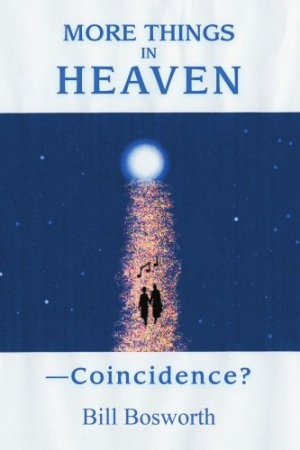More Things In Heaven - Coincidence?
At the age of 84, Bill Bosworth felt the time was right to share his collage of humorous and profound anecdotes, hard-won wisdom, and often miraculous experiences. After more than 50 years spent working through his human foibles, with the help of several Indian spiritual teachers, he hoped to be of service by recording the germane highlights of his life, and his sadhana, if only to his children and grandchildren.
Writing sincerely about one’s spiritual beliefs and experiences without appearing strange, evangelical, or self-righteous is extremely difficult, and Bosworth is to be commended for avoiding these pitfalls. That he was humbled and transformed by his decades of genuine searching is patently obvious. And that his infectious enthusiasm occasionally gets the best of him, is not surprising. Bosworth’s prose is sometimes choppy, things jumps around a bit, and there are times when it feels like he’s trying too hard. These weaknesses are easily forgiven, however, because he really did leave his ego at the door when he sat down to write More Things in Heaven, and his quirky guilelessness is refreshing. In fact, he unabashedly shares so many wildly serendipitous and unbelievable incidents, that they become almost mundane. But mundane in a wonderful way, because their ubiquity in his life convinces the reader that he was open to both magic and grace.
As a soldier in World War II, Bill Bosworth was a gunner in Germany whose experiences turned him into a pacifist, and made his return to civilian life difficult. He writes about these years with timeless candor, and many veterans of past and present wars will find solace and empathy in this memoir.
In the late 1950s, he met Swami Nitya Chaitanya, and thus began his avocation at the lotus feet of several paragons of the East. Guru Maharaji and Muktananda were next. Bosworth shares just enough about these three to entertain, awe, and whet the reader’s appetite for more. Rajneesh, now known as Osho, was his next teacher, and this long wit- and wisdom-filled chapter does not disappoint. From ego annihilation to tantric sex, Osho never failed to charm, provoke, and enlighten, and Bosworth captures this extraordinary and elusive sage beautifully.
His most significant and final teacher was still to come, and when he does enter Bosworth’s life, his writing takes on an emotional purity that is moving. When the disciple finds his true guru, everything changes, and Bosworth’s reverence for Sai Baba, shared by millions around the world, is palpable. Sai Baba is a renowned humanitarian and manifestation of unconditional love, but is most well known for pulling jewelry, sacred ash, and other things out of the air. Bosworth tells several amazing stories about these gifts, and Sai Baba’s profound influence on his life.
In the final chapter, Bill Bosworth writes about table tipping, a controversial and fascinating way he and several other devotees communicate with Sai Baba and the astral plane. The book ends with a few lovely poems Bosworth wrote. As an introduction to Indian spiritual teachers and their American devotees, of which there are many, this book would make an excellent primer. Lastly, though adequate the cover and title detract from the book’s professional look and feel.
Reviewed by
Patty Sutherland
Disclosure: This article is not an endorsement, but a review. The publisher of this book provided free copies of the book and paid a small fee to have their book reviewed by a professional reviewer. Foreword Reviews and Clarion Reviews make no guarantee that the publisher will receive a positive review. Foreword Magazine, Inc. is disclosing this in accordance with the Federal Trade Commission’s 16 CFR, Part 255.

